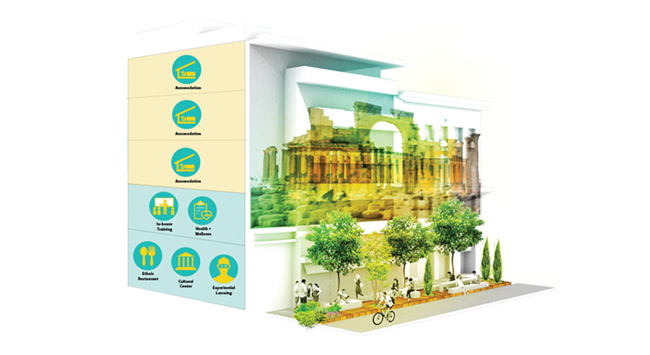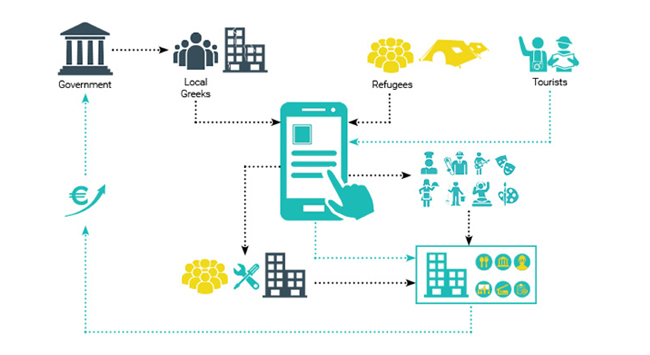Urban SOS finalist “The Living City” links refugees with abandoned buildings to address Athens’s “crisis within a crisis”
One of the four finalists in the Urban SOS: Fair Share student competition, “The Living City” tackles some of the most challenging issues of our time — migration and abandoned building stock post recession. The Living City proposes capitalizing on the more than 300,000 vacant units in Athens to allow refugees arriving in the city to start their own small business. We speak to Ho-Ting Liu, Faranak Khas Ahmadi, Anduriña Espinoza and Jenny Kyung Jin Lee, students from Harvard Graduate School of Design, University of California – Berkeley, University of Oxford and Columbia University, about their bold proposal.
What attracted you to the Urban SOS competition and this year’s theme of applying sharing economy principles to address urban infrastructure challenges?
We have always been intrigued by the human potential to adapt and solve problems creatively. After the recession, the sharing economy emerged in full force in response to challenging times. It has been so successful in certain sectors, but its potential has only barely been tapped. Creativity can tackle all sorts of problems, and this element of the competition has brought us to work together.
Anduriña studies migration and found studying through a lens of theories while migrants and refugees around the world are suffering to be challenging in its indirectness. Urban SOS provided us with a way to engage with the issues in a way that actively addresses the real challenges that high-migrant-receiving municipalities face on a day-to-day basis.
As a design student, the multidisciplinary approach appealed to Ho-Ting, offering an opportunity to engage with students from other disciplines. The idea of combining digital application with physical intervention really propelled us to look at urban issues through a whole new lens.

Aiming to revitalize abandoned buildings in Athens and help migrants contribute and adapt to their new communities, The Living City proposes creating hubs focused on culture and food production.
How did you develop your idea to address both the migration crisis and the economic crisis in Europe?
Athens holds particular appeal to us based on what Anduriña witnessed there when she visited the city with her Migration Studies cohort at the University of Oxford. She saw people who demonstrated resilience, humanity and justice, even in the face of a migration crisis within an economic one — a “crisis within a crisis,” as the Greek case was described. From our research, we know that there are over 300,000 abandoned houses and flats in the city — a legacy of the global recession. We also strongly believe that refugees are not passive victims, but human beings with skills, education, knowledge and ideas that they can contribute to the host society. Once we considered these two factors, we were able to put them together and come up with a solution.
Our project capitalizes on the unused potential of abandoned spaces in Athens to allow refugees living in the city to start their own small businesses. Taking inspiration from Airbnb, our digital tool helps match owners of abandoned buildings with refugees, enabling refugees to help local residents upgrade and restore their properties in exchange for space to set up their pop-up food stalls. The venture also capitalizes on the tourist stream that continues to flow into Greece. We designed our project to be as mobile, flexible and adaptable as the migrants themselves.

Technology would sit at the heart of the hubs, enabling migrants and building owners to find and list spaces and skills.
Your team brings together a wide range of expertise — how did you find each other, and what was your experience working on a multidisciplinary team?
It was a wonderful journey working together given the fact that we have never met physically but only virtually via Skype. During the summer, despite the fact that we were all in different time zones (in Asia, Africa and the U.S.), we really bonded over this project.
Finding each other was an interesting journey. Ho-Ting and Faranak first discussed the competition while talking about the migration crisis over dinner. As design students, limited knowledge on the migration issue propelled them to seek out other members with a background in international development. Anduriña and Jenny met Ho-Ting and Faranak via an open call for a team member. Neither Anduriña or Jenny knew each other, nor knew Ho-Ting and Faranak. Skype conversations followed, and the rest is history!
Anduriña was working on her dissertation, a topic that combines migration studies and urban studies, and was really compelled by the opportunity to combine these interests in a real-life competition. Our migration consultant, she helped us understand migration dynamics broadly, as well as the particular situation in Greece. Jenny was interning at a small tech startup in Nairobi, Kenya, as part of her Master of Public Administration in Development Practice degree at Columbia University. A transportation policy specialist, she helped the team dissect proposed ideas through a critical lens and offered constructive feedback. Ho-Ting and Faranak were both interning at a landscape architecture firm and always wondering while spending hours on Autocad if designers had a responsibility to respond to the migration crisis. They brought their expertise in design solutions and graphics.
Urban SOS is a global innovation competition that challenges students to collaborate across disciplines to re-imagine the future of our cities and pioneer unique solutions to urban challenges. The 2016 competition was themed “Urban SOS: Fair Share” and challenged students to combine the tools and technologies of the sharing economy with physical design to support more equitable access to resources, improve the built environment and enrich the quality of life of urban residents. Urban SOS: Fair Share was presented by AECOM and Van Alen Institute in partnership with 100 Resilient Cites. For more information on the competition visit aecom.com/urbansos.






